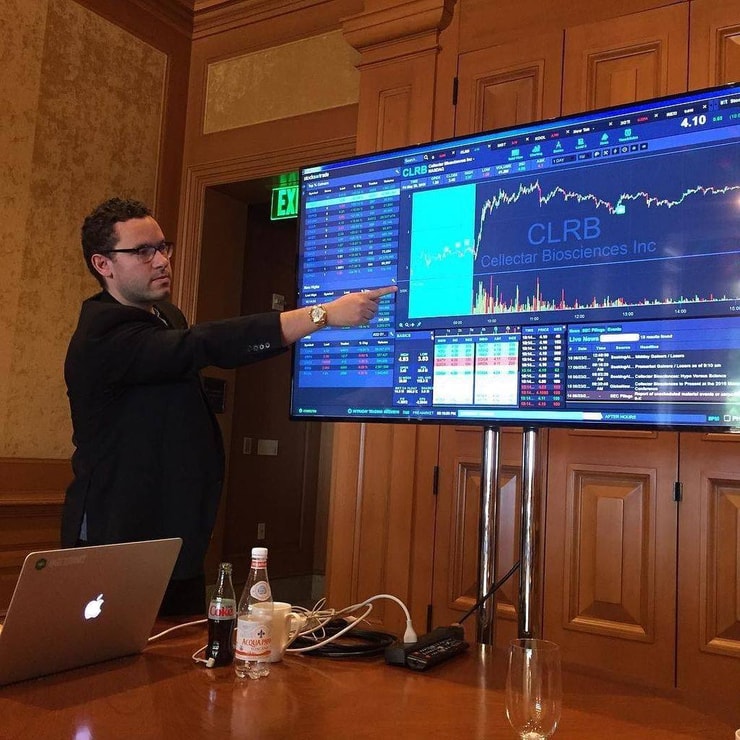Are day trading classes necessary to succeed as a trader? While this is a simple question, there isn’t a strict yes or no answer.
Technically, it’s possible to become a profitable trader without taking classes. But I can tell you with 100 percent certainty that all of my highest-achieving Trading Challenge students have had a far more enjoyable trading journey than I did.
My teachings are based on my own experience as a trader, which allows my students to take advantage of my most successful trading methods and to avoid the many mistakes I’ve made over the years.
Readers should delve into this article because it offers a comprehensive guide on the benefits and misconceptions of day trading classes, providing essential insights for both new and experienced traders.
I’ll answer the following questions:
- What are day trading classes?
- Why should you consider taking stock trading classes?
- What common misconceptions exist about day trading classes?
- What can you expect from a day trader education?
- How do day trading classes help in pattern identification?
- What role does mentorship play in day trading classes?
- How do day trading classes provide accountability?
- What day trading strategies will you learn in these classes?
Let’s get to the content!
Table of Contents
- 1 What Are Day Trading Classes?
- 2 What Can Be Traded?
- 3 Who Is Considered a Day Trader in Canada?
- 4 The Rules of Day Trading in Canada
- 5 How Much Do You Need to Start Day Trading in Canada?
- 6 Characteristics of a Great Day Trading Course
- 7 Common Misconceptions about Day Trading Classes
- 8 What to Expect From a Day Trader Education
- 9 Top Brokers That Provide Day Trading Education
- 10 Find the Trading Course That’s Right for You
- 11 The Bottom Line
What Are Day Trading Classes?

Day trading classes are exactly what they sound like: lessons that will help educate you about how the stock market works and how to employ day trading techniques.
The goal is that by taking these classes, you can learn the basics and be better prepared to pursue a career in trading. Day trading classes help you get a handle on how the market works, so that you’re not just jumping into things without knowing what you’re doing.
Day trading classes can take many forms. They can be taken in person. But like many other courses of education, there has been a big shift to the online format in recent years, because it offers a lot more flexibility.
Online day trading classes are generally a lot more desirable, particularly as most people who are interested in them have full-time jobs or other obligations that make it hard to commit to going into a physical classroom.
My Trading Challenge is a little different than most day trading classes …
Yes, there are plenty of lesson plans that are meant to educate you on the basics of trading. But my focus is on applicable, real-life approaches to trading. I want to enable my students to start trading.
Unlike many other classes out there, you can start to trade while you learn in the Trading Challenge. And as your teacher, I’m right there trading alongside with you, purposefully trading with a small account.
Why do I trade with a small account? So that I can operate on the same level as my students. This allows me to adapt my teaching to the current market climate and to continue to evolve and grow.
What Can Be Traded?
In the world of day trading, the range of what can be traded is vast. You’re not just limited to stocks; there’s a whole universe including options, futures, forex, and even cryptocurrencies.
Each market has its own nuances. For instance, forex trading involves pairs of currencies and is influenced by global economic events, while trading in stocks revolves around company performance and market sentiment. The key is understanding the price movement and risk management strategies specific to each market.
As a day trader, it’s crucial to diversify your trading portfolio. This doesn’t just mean trading different assets, but also employing various strategies. Whether it’s the high-speed world of intraday trading or the more calculated approach of options trading, each requires a unique skill set and knowledge base.
Who Is Considered a Day Trader in Canada?
In Canada, a day trader is someone who engages in frequent buying and selling of stocks, options, or other securities within the same trading day. The goal? To capitalize on short-term price movements.
Canadian traders operate in a market that’s not just limited to Toronto or Canada’s borders but extends globally. This means understanding not just the Canadian market, but also how international events can impact your trading.
It’s not just about the number of trades either. Being a day trader also means adapting to the daily fluctuations of the market, constantly updating strategies, and staying informed. It’s a full-time commitment, requiring dedication and a continuous learning mindset.
The Rules of Day Trading in Canada
Day trading in Canada comes with its own set of rules and regulations. Understanding these is crucial for anyone looking to dive into this fast-paced world.
First off, day traders in Canada are subject to capital gains taxes on their earnings. It’s not just about making profits; it’s also about understanding the tax implications and managing your finances accordingly.
Additionally, Canadian day traders must adhere to specific rules set by regulatory bodies, such as maintaining a minimum account balance and understanding the margin requirements. These rules are in place to protect traders from significant losses and to ensure the stability of the financial market. It’s not just about the trades you make; it’s also about understanding and following the rules that govern them.
How Much Do You Need to Start Day Trading in Canada?
Starting day trading in Canada doesn’t require a fortune, but it does require careful financial planning. The minimum amount needed varies depending on the broker and the type of trading you’re interested in. Generally, a few thousand dollars is a good starting point. This capital isn’t just for making trades; it’s also a buffer against potential losses.
Remember, day trading involves significant risk, and it’s possible to lose more than your initial investment. It’s not just about the money you put in, but also about how you manage that money. Risk management is key, and that starts with not investing more than you can afford to lose.
Day trading is a dynamic and challenging aspect of the stock market, requiring a solid understanding of market trends and quick decision-making. It’s not just about making trades; it’s about making smart, informed decisions based on real-time market analysis. For those looking to dive deeper into the intricacies of day trading, including strategies, risks, and rewards, gaining a comprehensive understanding is crucial. To explore the fundamentals and advanced concepts of day trading, check out my insights on day trading.
Why Take Stock Trading Classes?
Here are some of the biggest reasons why you should consider trading classes:
Understanding the Dangers
Sure, if you wanted to try scuba diving, you could just slap on a mask and a tank and dive underwater.
But you probably wouldn’t. You’d probably want to hear at least a brief primer on how to use the equipment and listen to a few pointers on how to breathe underwater before you took the leap. Because, you know, you value your life.
I think you get the point I’m trying to make. No, day trading might not carry the same direct risk of bodily harm as scuba diving. But before taking on an undertaking that involves risk, you need to learn some basics so that you can stay safe.
With day trading, you’re risking your hard-earned cash in an enterprise which has a high failure rate. It’s a simple fact: many new traders fail. Day trading classes can be a way to separate yourself from the sobering statistics.
By taking day trading classes, you’ll give yourself an advantage. You can avoid learning things the hard way and avoid the pitfalls that cost people like me money, which can keep you motivated to keep climbing.
Prepare Yourself for the Life of a Day Trader
Day trading classes can also serve as a great introduction to the day trading lifestyle and schedule.
Many people want to become day traders because of the flexibility it offers. One of the biggest advantages of day trading is that you can do it from anywhere.
Really, all you need is a brokerage account and an internet connection. This makes day trading accessible to just about anyone. This also allows for a lot of freedom in terms of scheduling and location.
Day trading classes allow similar flexibility. You don’t need to load up a backpack and head to a classroom to take a day trading class. The lessons are all available online.
With my Trading Challenge, you can study live and archived lessons from literally anywhere in the world that has an internet connection. You can browse my 1,000+ online webinars to study at any time of day.
Of course, you’ll still have to put in the work. I’m not going to hold your hand. You do have to have a certain level of self motivation and discipline to set a routine and stick with your studies so that you can get the most from them.
These things are necessary to become a successful day trader anyway, though — so you might as well start working on these trader habits now!
Characteristics of a Great Day Trading Course
A great day trading course should offer more than just the basics. It should provide a comprehensive overview of different trading strategies, risk management techniques, and insights into the psychology of trading. Look for courses that offer practical, hands-on training, possibly with simulations or real-time trading practice. Instructors should be experienced traders themselves, with a track record of success and a deep understanding of the market.
The best courses are those that don’t just teach you how to trade, but also how to think like a trader. This includes understanding market trends, how to react to price movements, and how to stay disciplined in your trading approach.
Common Misconceptions about Day Trading Classes

Plenty of new traders are resistant to the idea of taking day trading classes. Often, it’s due to a few common misconceptions. Let’s discuss some of them:
More Breaking News
- MNTS Stock Surges Amid Strategic Expansion and Financial Insights
- Kyndryl Holdings Stock Shows Mixed Performance Amid Market Turbulence
- Skyward Surge: Momentus Inc. Soars and Faces Market Dynamics
- Robinhood Appointed Trustee for Trump Accounts, Stock Rises
“But I Don’t Need Them”
From the outside looking in, day trading can look easy. Pick some stocks, make some trades, rake in the cash, right?
But then, once you get started, you’ll begin to see how tricky it can actually be. Losing money is way too easy.
While day trading doesn’t require an advanced degree, it does require a strong knowledge base. Making money as a trader is rarely the result of dumb luck; it requires skills that come with lots and lots of studying.
Yes, you could gain this knowledge through experience. That was my approach as an early trader. But I also lost a lot of money and made a lot of mistakes learning these lessons. I probably could have avoided a lot of losses if I’d had guidance.
Would you rather learn things the hard way?
“They’re Too Expensive”
Plenty of people don’t want to spend money to become day traders — they simply want to earn money. And since one of the big advantages of day trading is that you don’t need to have a huge account to get started, it can seem backward to invest in day trading classes.
However, to dismiss day trading classes as a waste of money is short-sighted. It’s important to look at the big picture here, as the cost of a lack of education can be infinitely greater than that of a proper education.
Think about paying for college. You pay tuition to invest in your future. The idea is that investing in your education will pay off in the long run by making you better prepared and positioned to be successful in your career.
Yes, you can find free resources on day trading online. I’ve even created many, including my Pennystocking 101 E-Guide.
But this basic information should only act as a starting point for new traders. By educating yourself through day trading classes, you can delve a lot deeper and learn a lot more.
Additionally, you should consider that by taking day trading classes, you could be saving money in the long run. How?
Well, many of my students started out believing they didn’t need day trading classes or were unwilling to make the investment.
Guess what? They got in the market and lost a ton of money. Then, they realized it would be worth their while to join the challenge and actually learn how trading works.
So in a delayed way, they realized the money was well spent. So, would you rather spend a little money now and prevent losses as you start trading? Or would you prefer to lose money?
“I Don’t Have Enough Time”
This is a common excuse — I mean reason — that I hear from people who are on the fence about taking day trading classes. Unfortunately, it’s total bullshit.
Everyone — and I mean everyone — can find more time for things that matter. There are so many ways to find more time. The thing is, it might mean letting go of some of your bad habits.
For instance, if you want to find more time for day trading classes, you can start waking up earlier. Most millionaires wake up early anyway, so it’s a good habit to adopt.
Alternately, you could reduce the amount of time you spend on Facebook or social media, or indulging in less Netflix binge-watching.
I’m not trying to be harsh. But if you want to become a day trader, you need to make time. Nobody will make time for you. And if you don’t have time for day trading classes, you definitely don’t have enough time for day trading!
Making time to become a day trader requires that you make time to study. This may require some sacrifice in terms of how you spend your time and money. But you really need to think about what you want more: success, or to stick in your comfort zone?
What to Expect From a Day Trader Education

Here are some of the key things you can expect to gain from a day trader education:
A Strong Foundation
In just about any field, it’s important to have a strong foundation of knowledge before you can build a successful career.
Day trading is no different. A strong knowledge base is incredibly important. It helps ensure that you understand the market mechanics, how to execute trades, trade order types, and how to choose stocks, just to name a few of the many benefits.
Taking a day trading class can help you build a strong foundation of trading knowledge. You’ll learn from the beginning, so that as you build more knowledge, you’ll be better able to grasp the market and how trading principles tie into it.
When you learn from the bottom up, you’ll be more likely to remain strong and unshakable when faced with the challenges that day trading can (and will) throw your way as you progress in your career.
Learn a Number of Trading Methods
There are plenty of different ways to approach trading.
As you know if you read this blog regularly, my favored method of trading is to choose low-priced stocks and trade based on tracking reliable patterns and stock chart history.
As a teacher, I focus strongly on teaching my students all about these methods, because they are time-tested and can be effective in both bull and bear markets. I’m an open book: I share everything I do with my students, tracking every trade on Profit.ly and regularly sharing watchlists.
However, I don’t solely teach my students what I do. I want to teach them how to think for themselves, not just how to follow someone else’s trades.
So, I also introduce my students to other trading methods, so that they can choose their own path. I want to expose them to all sorts of trading types, from mutual funds to forex trading to options trading and more. This exposure empowers you as a student and as a trader.
If you were to just start trading without assistance, you might figure out certain methods of trading that work for you in time. But what is more common is that traders don’t understand the different types of trading, and end up just copying other more established traders.
This is something that you should never do.
Why not? Because it never really works. If you’re a follower, you’ll always come into trades a little late and there will always be factors about their fundamental or technical research that you won’t be privy to.
You need to learn to think for yourself.
If you take day trading classes, you’ll be exposed to more styles of trading than you might be otherwise. Armed with an education, once you begin trading on your own, these methods will begin to make sense. You’ll be better able to make decisions that suit your style as a trader.
When you have mastery of a number of different trading methods, you’ll be far more nimble as a trader. You’ll also be better prepared to deal with shifts in the market with more trading tools in your repertoire.
Pattern Identification
In my Trading Challenge, I put a lot of emphasis on teaching my students about pattern recognition. If you can find predictable patterns in a stock’s performance and can take advantage of this, it will serve you well as a trader.
I truly believe that by learning to identify patterns with stocks, you can make the most educated trades and mitigate risk as much as possible. This methodology is the backbone of my trading career.
However, learning how to identify trading patterns isn’t always easy. It takes time and targeted study. A day trading class can help you learn how to identify patterns faster and more effectively.
Once you begin to be able to identify patterns, you will begin to understand the types of trades that can help you profit as a trader.
If you keep a trading journal and keep track of what you’re doing that makes you money, you can take advantage of patterns and keep refining your methods and improving your profits over time.
Mentorship
Having a mentor is like having a fast-forward button on your trading career.
You can learn a lot from someone who is further along in their career than you. One of the biggest benefits is that they can they offer extremely relevant and targeted advice from a place of experience.
But they can also help you get a leg up by teaching you what they did right … and help you avoid mistakes by schooling you on what they did wrong.
With the help of a mentor, you can potentially ascend toward success faster and sail past some common pitfalls for new traders.
No, it’s still not going to be easy, but why make it harder than it needs to be? I act as a mentor to my Trading Challenge students so that they can avoid some of the mistakes I’ve made as a trader.
Accountability
If you want to realize your goals and dreams, you need to work hard. To work hard over time requires a massive amount of self motivation.
Staying motivated isn’t always easy, and it’s even harder when you’re trying to do everything yourself. Having a source of accountability can be extremely helpful in allowing you to stay on track and not give up when times get tough.
Day trading classes can help offer a resource that keeps you accountable and helps you maintain motivation. Your mentor and your fellow students help you form a community that keeps you on task and inspired to keep growing and learning.
Day Trading Strategies

When you take day trading classes, you’ll be clued in on day trading strategies that you otherwise might have to learn the hard way, losing money (and potentially motivation) as you go.
Here are some of the things you’ll learn about in my Trading Challenge:
Chart Patterns
History rarely repeats itself exactly, but often close enough to merit consideration. When you look at a stock’s performance over time, are there patterns that seem to be reliable or predictable?
This is a topic that is covered extensively in my day trading classes and that every trader should know.
Volume and Volatility
Trading volume can be extremely easy to understand. It simply refers to the amount of stock shares that are being sold or bought during a specific period, like a trading day. However, making use of volume and volatility can prove a little bit trickier.
Day trading classes can help you better understand the factual definitions of indicators like volume and volatility to and how they apply in conjunction with applications like stocks to trade.
Moreover, you’ll learn how to identify momentum and trends, see the price action, determine ease and entry of exit, be able to determine strong trading plans, and perform effective fundamental and technical research.
Trading Challenge
I’ve been trading for a long time, and I’ve learned plenty on my trading journey. Much of the knowledge I’ve amassed I’ve learned the hard way, because when I started out, there weren’t many day trading education resources out there.
As a teacher, my motivation is to help my students by giving them the education and information I wish I’d had access to when I was first starting out.
My Trading Challenge was created based on the knowledge I’ve gained over the years. I want to help you potentially profit from the ever-changing stock market by taking advantage of reliable methods of trading.
My challenge includes literally thousands of resources. There are lessons, webinars, blog posts, and more. This is a comprehensive online stock trading training. It’s designed to get you out there and trading as you learn.
As mentioned, I trade alongside my students every day with a small account — so I can stay on a similar level of trading and be the most effective teacher I possibly can be.
Top Brokers That Provide Day Trading Education

When it comes to day trading education, some top brokers stand out, including InteractiveBrokers, E-Trade, and Robinhood. These platforms offer more than just a place to trade; they provide valuable educational resources for traders at all levels.
InteractiveBrokers, for instance, is known for its comprehensive library of training courses and webinars, catering to both beginners and more experienced traders. E-Trade offers a range of tools and resources, including training on specific trading strategies and market analysis. Robinhood, while newer to the scene, has made a name for itself with its user-friendly interface and educational content aimed at entry-level traders.
These brokers all understand that education is a crucial part of trading success.
It isn’t just education you should look for in a broker — the right tools can make a significant difference. Stock scanners are invaluable for traders, allowing them to filter stocks based on specific criteria quickly. This tool helps in identifying potential trading opportunities faster than manually scanning the markets. Understanding how to effectively use stock scanners can significantly enhance your trading efficiency and success. For a deeper understanding of how stock scanners can be a game-changer in your trading strategy, delve into my guide on how to use stock scanners.
Find the Trading Course That’s Right for You
Finding the right trading course is about aligning your learning needs with the expertise offered. Whether you’re a beginner needing an overview of the basics or an experienced trader looking to refine your strategy, there’s a course out there for you.
Consider factors like:
- The course structure
- The qualifications of the instructors
- The type of trading it focuses on
It’s not just about learning how to trade; it’s about finding a course that resonates with your trading style and goals. Remember, the best investment you can make is in your education. The right course can provide invaluable insights and set you on the path to becoming a successful trader.
Options traders need to learn from teachers who specialize in this complicated strategy — teachers like my millionaire student Mark Croock! Options trading offers a different dimension to the stock market, providing unique opportunities and strategies, particularly for those looking to leverage their trades. Understanding the complexities and potential of options trading can be a valuable addition to any trader’s skill set.
That’s why Mark created his Evolved Trader mentorship program. It’s the best guide to options trading that I’ve seen.
For traders curious about incorporating options into their trading arsenal, gaining a thorough understanding is key. Explore the world of options trading and its strategic applications in day trading with my guide on options trading.
The Bottom Line

Day trading classes can help you become a more effective trader. They offer many benefits for both newbie traders and those who tried to go it alone and found the process challenging.
Day trading classes can help you streamline your learning curve and refine your trading methods so that you can be more prepared to deal with what the market sends your way.
Trading isn’t rocket science. It’s a skill you build and work on like any other. Trading has changed my life, and I think this way of life should be open to more people…
I’ve built my Trading Challenge to pass on the things I had to learn for myself. It’s the kind of community that I wish I had when I was starting out.
We don’t accept everyone. If you’re up for the challenge — I want to hear from you.
Apply to the Trading Challenge here.
Trading is a battlefield. The more knowledge you have, the better prepared you’ll be.
What do YOU want to learn to become the best trader YOU can be? Let me know in the comments!



Leave a reply